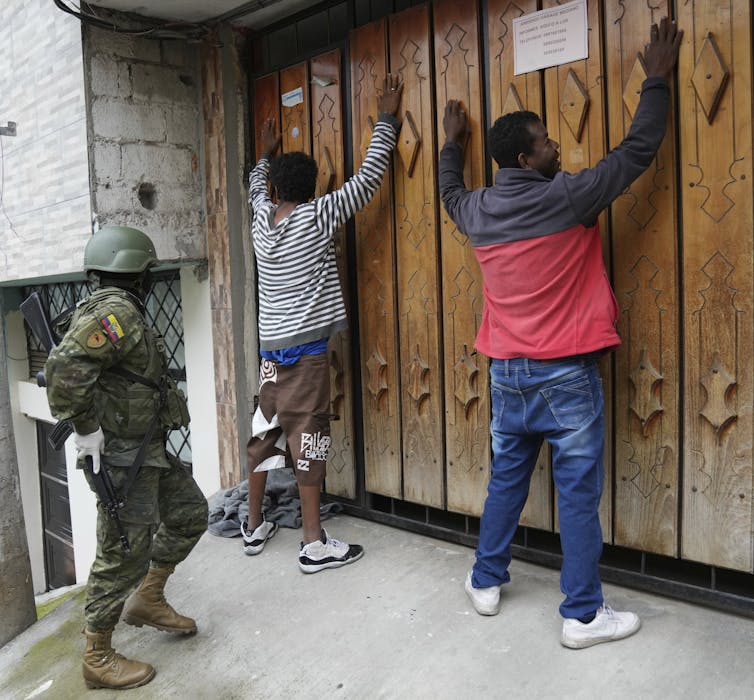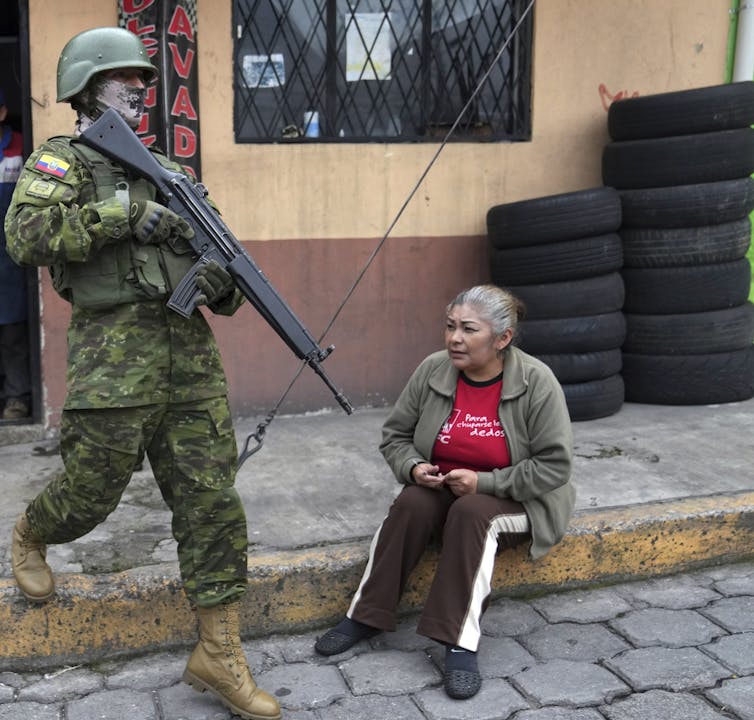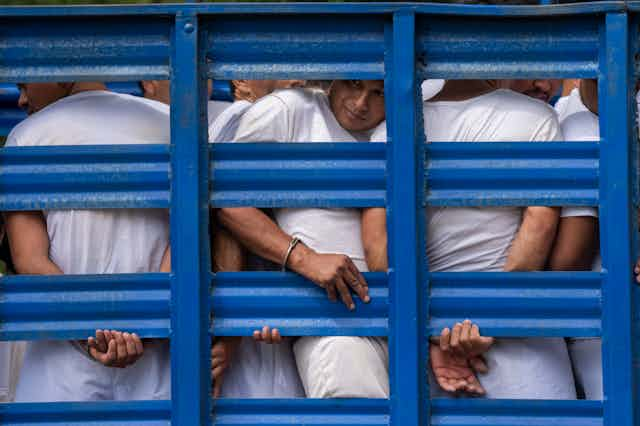Ecuador’s unexpected gang-related security crisis has resurrected the debate on what’s known as Bukelism, the supposedly miraculous anti-crime strategy named after El Salvador President Nayib Bukele.
Bukelism is credited with dramatically reducing El Salvador’s drug-related homicide rates from 38 per 100,000 people in 2019 to 7.8 per 100,000 in 2022.
This model has, however, come at the cost of an authoritarian drift in El Salvador and American sanctions for corruption.
Nonetheless, on April 21, Ecuador will hold a landmark referendum to change its constitution in order to emulate the Salvadorean model.
If Ecuadorans vote in favour of these unprecedented reforms on security, they will not only give permanent and extensive powers to the country’s armed forces — along with immunity measures and the dismantlement of democratic checks and balances — but they will also normalize Bukelism, even though recent studies question its effectiveness.

Eroding democracy
Ecuador is among a growing number of countries in the region that want to implement this seemingly successful new style of the war on drugs. They’re apparently willing to disregard the impact on freedom of the press and democracy to curb the narco-trafficking crisis.
In 2022, El Salvador declared states of emergency several times and incarcerated more than 73,000 people, giving it the highest incarceration rate in the world.
These strong-arm tactics against crime give the public a reassuring image of control, even though the massive arrests targeted thousands of innocent people and 327 citizens were forcibly disappeared, according to a recent Amnesty International report. In addition, almost 200 died in state custody.
The United Nations has called on El Salvador to stop torturing detainees. Attacks on female journalists by authorities and supporters of Bukele’s methods have also increased dramatically, illustrating how Bukelism’s aggressive rhetoric has had a significant impact on journalists, especially women, in a country where abortion has also been completely banned since Bukele’s election.
Yet, even the country’s worst infringements on the rule of law, including hundreds of show trials and laws threatening journalists with 10- to 15-year prison sentences for criticizing law enforcement, are often regarded as evidence of Bukelism’s effectiveness.
Read more: El Salvador's façade of democracy crumbles as president purges his political opponents
Bukelism’s popularity
According to experts like Laura Chinchilla, Costa Rica’s former minister of public security and justice, the popularity of Bukelism is rising largely because it’s frequently described in the media as the only effective model to fight gangs. Chinchilla argues that the Salvadorean model is only a “mirage” that ignores other efficient security strategies that don’t dismantle the rule of law, such as her country’s efforts a decade ago.
This myth of Bukelism’s effectiveness creates a dilemma for other democratic countries plagued by drug-trafficking violence: should they opt for the successes of Bukelism despite human rights violations, or choose other strategies that uphold democratic norms?
But this is a false dilemma based on incorrect assumptions, because Bukelism is not as effective as it seems.

A recent report from the International Crisis Group, one of the world’s most trusted non-governmental organizations on security issues, shows that drug-related homicide rates had already fallen by 60 per cent before Bukele’s massive crackdown in 2022. The report also points out that democratic countries like Ecuador can’t duplicate Bukelism without trading off democracy.
In fact, by stifling political opposition, imposing presidential control over the judicial, executive and legislative branches and muzzling the media, El Salvador has slipped to the bottom 25 per cent of countries worldwide in terms of democracy since Bukele was first elected in 2019.
Freedom House’s well-known annual study of political rights and civil liberties worldwide rated El Salvador as “partly free” in 2023, along with countries such as Kuwait, Malaysia and Hong Kong.
Bukelism’s questionable results
Data from the U.S. task force Vulcan also show homicide rates have been steadily declining in El Salvador since 2016 due to deals with drug-trafficking gangs.
Bukele’s 2022 crackdown “frenzy,” as the think tank Insight Crime calls it, was therefore merely a reaction to the cartels’ decision to disregard the deals they had previously made with the government.
El Salvador’s small population and its unique geography are also key factors in Bukelism’s purported success that don’t always exist elsewhere. Ecuador, for example, has three times El Salvador’s population and a completely different landscape. What’s more, the country’s drug gangs can’t be compared to other Latin American drug cartels in terms of financing, weapons and equipment.
The importance of these factors is evident in failed attempts to implement Bukelism elsewhere. Recent data shows that neighbouring Honduras has failed to achieve significant results adopting similar measures. After more than six months of duplicating El Salvador’s war on gangs, the country still has the second-highest homicide rate in Latin America.
At the opposite end, Colombia seems to be on track to achieve its new “total peace plan” by negotiating with its most iconic drug cartels, including the Clan del Golfo, and providing education for impoverished young people.

Corruption is part of Bukelism
But perhaps Bukelism’s biggest flaw is its widespread corruption. Despite U.S sanctions in 2022, the rampant corruption among state entities, the armed forces and the private sector is too often ignored by the media.
This contributes to the false image of Bukele’s efficiency. Given that new laws restricting the freedom of the press were recently adopted, and checks and balances such as judicial independence are under attack, corruption is unlikely to receive the media attention it warrants in El Salvador.
This perfect storm of corruption, human rights violations, extended military powers, institutional impunity and criminalization of journalists poses serious risks to the region.
Mexico embraced a model similar to Bukelism in the 2010s, and its war on drugs failed, transforming the country into one of the three worst in the world in terms of the level of violence and human rights violations against environmental activists and journalists.
Ecuador and other nations flirting with Bukelism must not make the same mistake.

